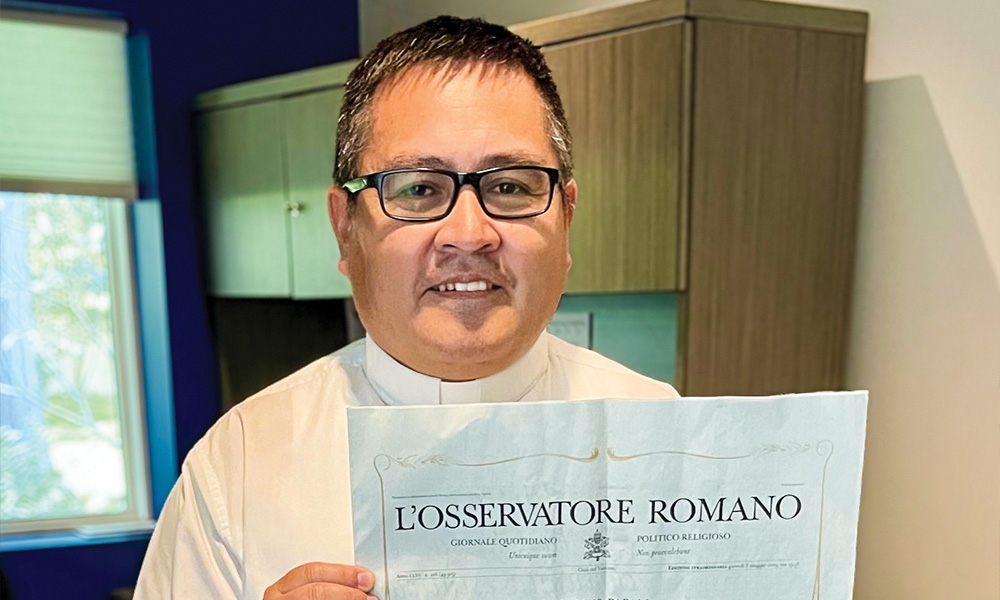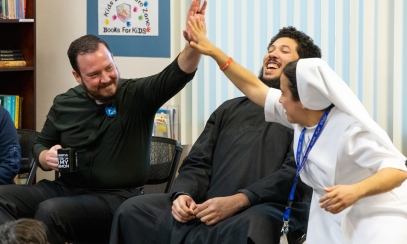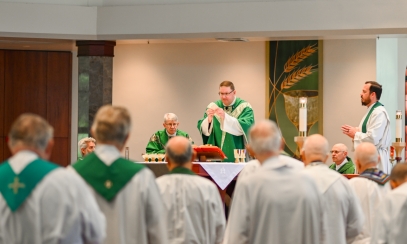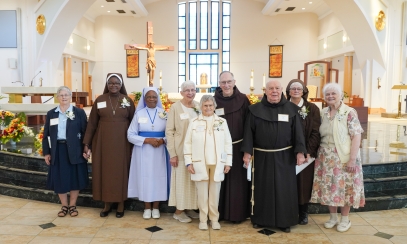
Missionary Spirit
On May 8, the eyes of the world were on the balcony of St. Peter’s Basilica, waiting for the announcement of the next pope. One of those watching was Father Amaro Ortiz, parochial vicar of St. Catherine of Siena Parish, in Clearwater. When the name was finally said, he was overjoyed to hear “Robert Francis Prevost.” At that moment, he realized the newly elected pope had been one of his seminary professors in Peru. We talked with Father Ortiz about his experience and the impact of being able to study under Pope Leo XIV.
On May 8, the eyes of the world were on the balcony of St. Peter’s Basilica, waiting for the announcement of the next pope. One of those watching was Father Amaro Ortiz, parochial vicar of St. Catherine of Siena Parish, in Clearwater. When the name was finally said, he was overjoyed to hear “Robert Francis Prevost.” At that moment, he realized the newly elected pope had been one of his seminary professors in Peru. We talked with Father Ortiz about his experience and the impact of being able to study under Pope Leo XIV.
1. Can you describe when and where you met him?
I met Father Robert Prevost, now Pope Leo XIV, in 1998 when I entered the San Carlos and San Marcelo Major Seminary, of the Archdiocese of Trujillo. That same year, I had the privilege of having him as a professor.
2. What classes did you take with him and what did you think of his teaching style?
He taught me Catechetical Pastoral Ministry, The Mission of the Church in the World, the Need for a New Expression of the Gospel, and The Church’s Social Justice, among other classes.
Even though we didn’t have the internet back then, he tried to be an innovative teacher. He aimed to make classes impactful for the students. He cared about the students truly understanding what we were discussing.
3. How did studying with him influence your vocational journey in the seminary?
What has always inspired me in my vocation is his missionary spirit, his drive to take the Gospel to the most forgotten. I believe that’s part of why I’m here today. Most of my professors were Augustinian and Jesuit missionaries.
He especially encouraged us to be faithful to God, to be men of prayer, to listen to our inner selves, to listen to our brothers, to speak less and listen more. He told us that the people of the parish and of the town had much to teach us and that we must learn from them.
4. What unique qualities did you see in him that you believe will be reflected in his papacy?
The qualities he has always had are his ability to listen, his silence and humility, and his ability to dialogue with everyone and always seek unity. He often told us we must be priests who promote unity. He used to say it was sad to see a divided clergy or diocese.
5. How have his teachings and mentorship influenced your priestly life?
His teachings have had a great impact on my priesthood, especially regarding social justice, his environmental commitment, his humble and approachable priestly style, and his missionary spirit. He always talked about a Church that forms missionary priests.
6. Where were you and what did you think when you heard his name as the new pope?
I admit that when I heard that Pope Francis appointed him Bishop of the Diocese of Chiclayo, Peru, the city where my entire family now lives, I was immensely happy.
I personally sensed that if he was going to Chiclayo as bishop, it was for a reason. Later, I heard that Pope Francis named him Cardinal and called him to Rome. At that point, I became even more certain he was on the path to becoming a candidate for the papacy.
Three weeks before the conclave, the media and social networks began talking about him as a possible papal candidate. But soon, they stopped mentioning him and focused on other likely candidates. Still, I had a gut feeling, albeit remote, that he would be the new pope.
On Wednesday, May 7, one day before his election, a woman asked me if I knew Cardinal Robert Prevost. I told her, “Yes, he is going to be the new pope.” At the same time, another woman in a group asked to pray for Cardinal Prevost to be elected. I responded, “Yes, tomorrow he will be the pope,” and I went to sleep thinking of him.
The next day, I was nervous about who would be elected pope. I went out to anoint a sick person and returned quickly, turned on the TV, and waited 15 or 20 minutes. Suddenly, I saw the Protodeacon come out and declare: “Annuntio vobis gaudium magnum: Habemus Papam!”—Cardinal Robert Francis Prevost.
I honestly began to shout with joy and cry with emotion. I said, “Oh God, you are always with us, you always hear us, you never leave your Church alone. This is another confirmation in our lives that you are by our side. Oh God, it’s incredible that you chose Robert Prevost as pope. Thank you, Lord, for such a great miracle.”
Immediately, memories came flooding back: Father Prevost teaching at the seminary, leading retreats, giving academic lectures, arriving each morning with students from his Augustinian congregation, driving his van.
7. What does it feel like knowing someone you learned from now leads the global Catholic Church?
I truly feel immense joy. I feel very blessed knowing he is now the pope. The professor who invited us to walk together, to live in fraternity, communion, and unity, to prepare ourselves to serve God and the people, the missionary priest who walked through the mountains of my Diocese of Chulucanas, where I was born, and later served in Chiclayo — all this fills me with joy and gratitude.
He is a good man with a noble and sincere heart. Now I pray even more for him, because the mission he now has is not easy.
8. How did those who knew him in Peru react to his election?
His election brought great joy and deep emotion to all Peruvians; it created a festive spirit across the country. It felt like winning the World Cup. From the moment it was announced that he was the pope, people took to social media to share memories and moments they had with him. Since his election, there have been many celebrations in the country, in gratitude for what he did, for his closeness, and for his love for the Peruvian people.
9. Could you share a valuable lesson you learned from him to pass on to young students today?
He stressed unity, fraternity, listening to one another, engaging in dialogue, and respecting other cultures. He encouraged us to face life’s challenges with courage and to give our best according to God’s will or plan. He told us not to be afraid to do good."



